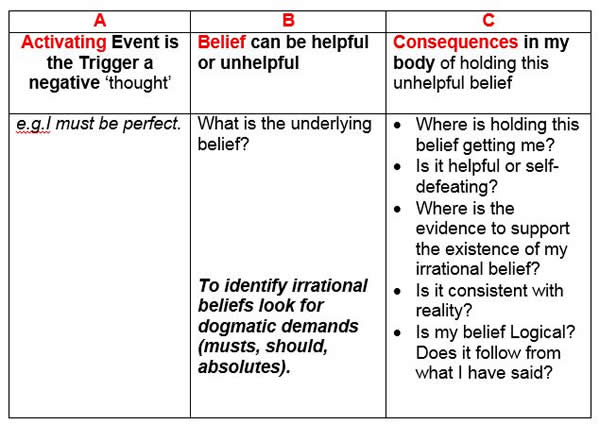Positive Health Online
Your Country

Using Rational Emotional Behaviour Therapy (REBT) – for Managing Internal Stress
listed in nlp, originally published in issue 269 - March 2021
‘Our mind is our garden, our thoughts are our seeds;
We can grow flowers – or we can grow weeds’
Rational Emotive Behavioural Therapy (REBT) is one of the cognitive behaviour therapies under the CBT umbrella. It is a trans-diagnostic, evidence based, and philosophical therapy developed by Albert Ellis in the 1950s. It is a philosophical model grounded in self-acceptance.
There is considerable evidence to demonstrate REBT’s effectiveness in dealing with a range of psychological problems. It is also a psycho-educational model whereby we teach clients how to use the ABC model to recognize and dispute their own irrational beliefs.

Is this a healthy belief to hold that gives me access to helpful rational thinking of concern? Or is the inference threat or danger which leads to anxiety?
A person’s emotions, thoughts and behaviours can be healthy and functional, or unhealthy and dysfunctional. It, therefore, follows that an individual’s beliefs can also be rational, healthy and functional, or irrational, unhealthy and dysfunctional.
REBT encourages the client to focus on their emotional problems in order to understand and change the irrational beliefs that underpin their Problems.

Albert Ellis who developed the model characterises REBT’s approach and goals by saying that REBT is not, “…primarily interested in helping people ventilate emotion and feel better, but in showing them how they can truly get better, and lead happier healthier, non-self-defeating, more self-actualized lives.”
Using REBT Helps us Recognize Symptoms of Stress in Ourselves
We explore how we stress ourselves using internal dialogue. It’s not just the events happening around us that affect our stress levels; it is how we choose to think about them and what we tell ourselves about them that will affect our physical and mental well-being.
What happens in our brain when we keep running bad scenarios? We become anxious, our body becomes overwhelmed and we frighten ourselves.
There are Two Main Types of Anxiety
- Anxious Apprehension
Which is a verbal worrying, that is talking to our self in an anxious way. When neuroscientists study anxious people’s brains in MRI scanners, whilst participants are running Anxious Apprehension, the left side of their brain lights up and becomes illuminated. - Anxious Arousal
Anxious Apprehension leads to Anxious Arousal which activates and lights up the right side of our brain, caused by our anxious thoughts and what we are telling ourselves about the situation. - Worrying leads to more anxious emotional feelings such as fear, anxiety and overwhelm. On an MRI scanner this kind of anxious self-talk lights up the person’s right brain as the person becomes overwhelmed. It activates the temporal lobe which we associate with danger – and it sends the message that we need to avoid that danger.
The Body Goes into Fight, Flight, or Freeze
Once we press our anxiety buttons our body becomes tense, we over breathe, heart starts pounding and our body goes into Fight, Flight or Freeze mode. The blood pumps harder and is deployed away from the brain to the extremities so that we are primed to run away from impending danger. But there is no physical danger; we are trapped instead by our thoughts. Our action tendency when we are anxious is to run away from the danger. We may overreact with anxious irrational thoughts.
The aim of employing the ABC model is to help us to move our thinking from anxious arousal to healthy concern. Because healthy concern leads to immediate rational functional thinking – we can get back control of our thinking again.
Men are disturbed not by things, but by the view which they take of them. It's not what happens to you, but how you react to it that matters. Epictetus 50AD
A person’s negative emotions, thoughts and behaviours can be healthy and functional, or unhealthy and dysfunctional if they are not helping us get the outcome we want.
- It, therefore, follows that an individual’s beliefs can also be rational, healthy and functional, or irrational, unhealthy and dysfunctional.
- REBT encourages the client to focus on their emotional problems in order to understand and change the irrational beliefs that underpin these Problems.

D: Dispute your thinking, one thought at a time. Develop positive thoughts. Substitute each though in the Belief column with a more helpful thought. Turn ‘I must…’ into ‘I would like to…’ or ‘I would prefer to…’ Turn ‘It’s awful that…’ Into ‘It’s inconvenient, I don’t like it... but I accept that’s what happens;
E: Set reasonable, reachable goals, effective new strategies with markers on the way to let you know how you’re doing;
F: Feelings – remember feelings change last. Do the action repetitively and eventually the feelings will change.
Comments:
-
No Article Comments available